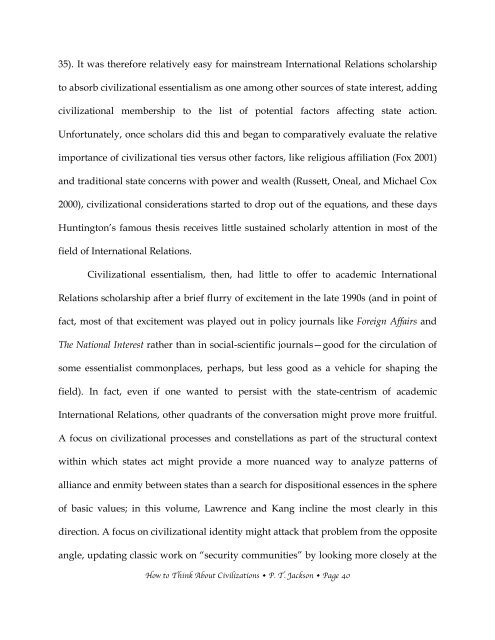How to Think About Civilizations - The Watson Institute for ...
How to Think About Civilizations - The Watson Institute for ...
How to Think About Civilizations - The Watson Institute for ...
Create successful ePaper yourself
Turn your PDF publications into a flip-book with our unique Google optimized e-Paper software.
35). It was there<strong>for</strong>e relatively easy <strong>for</strong> mainstream International Relations scholarship<br />
<strong>to</strong> absorb civilizational essentialism as one among other sources of state interest, adding<br />
civilizational membership <strong>to</strong> the list of potential fac<strong>to</strong>rs affecting state action.<br />
Un<strong>for</strong>tunately, once scholars did this and began <strong>to</strong> comparatively evaluate the relative<br />
importance of civilizational ties versus other fac<strong>to</strong>rs, like religious affiliation (Fox 2001)<br />
and traditional state concerns with power and wealth (Russett, Oneal, and Michael Cox<br />
2000), civilizational considerations started <strong>to</strong> drop out of the equations, and these days<br />
Hunting<strong>to</strong>n’s famous thesis receives little sustained scholarly attention in most of the<br />
field of International Relations.<br />
Civilizational essentialism, then, had little <strong>to</strong> offer <strong>to</strong> academic International<br />
Relations scholarship after a brief flurry of excitement in the late 1990s (and in point of<br />
fact, most of that excitement was played out in policy journals like Foreign Affairs and<br />
<strong>The</strong> National Interest rather than in social-scientific journals—good <strong>for</strong> the circulation of<br />
some essentialist commonplaces, perhaps, but less good as a vehicle <strong>for</strong> shaping the<br />
field). In fact, even if one wanted <strong>to</strong> persist with the state-centrism of academic<br />
International Relations, other quadrants of the conversation might prove more fruitful.<br />
A focus on civilizational processes and constellations as part of the structural context<br />
within which states act might provide a more nuanced way <strong>to</strong> analyze patterns of<br />
alliance and enmity between states than a search <strong>for</strong> dispositional essences in the sphere<br />
of basic values; in this volume, Lawrence and Kang incline the most clearly in this<br />
direction. A focus on civilizational identity might attack that problem from the opposite<br />
angle, updating classic work on “security communities” by looking more closely at the<br />
<strong>How</strong> <strong>to</strong> <strong>Think</strong> <strong>About</strong> <strong>Civilizations</strong> • P. T. Jackson • Page 40
















